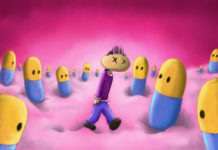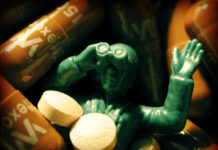New Study Explores Approaches to Discontinuing Antidepressants
Psychiatrist and psychologist outline pharmacological and psychotherapeutic strategies for discontinuing antidepressants.
Gradual Tapering is Most Successful for Withdrawal from Antipsychotics
Mixed-Methods study explores the experiences of antipsychotic discontinuation among service users.
What Happened When I Went Off Meds and Onto Nutrients
I remember clearly thinking, “I’m done. I’m not putting myself through this again.” I wasn’t going to settle for the side effects of a marginally better than placebo treatment again. Here is a brief look into my rollercoaster journey of recovery, returning to work, having my trauma re-triggered, finding a way through, and finally living well.
SNRIs Added to the List of Drugs with Potential Withdrawal Symptoms
New research suggests that clinicians should exercise caution prescribing SNRIs as first-line treatment for mood and anxiety disorders.
Systematic Review Finds Antidepressant Withdrawal Common and Potentially Long-lasting
Prominent researchers conduct a review of antidepressant withdrawal incidence, duration, and severity. Results lead to call for new clinical guidelines.
Recovering Emotions After 24 Years on Antidepressants
My therapist and I jointly made the decision to wean me off of the drugs. In the beginning, it was a very scary process for me. Since I had twice gone off medications on my own, I knew how bad it could get. The good news is, I am alive. I feel alive, and I now have emotions, both good and bad. I am very grateful to have all of them.
Antidepressant Use Climbs as Patients Find it Difficult to Discontinue
Findings point to the role of withdrawal symptoms and prescriber practices in long-term antidepressant use.
New Research on Patient-Centered Deprescribing for Antipsychotics
Researchers review the risks and benefits of deprescribing from antipsychotic drugs and advocate for a patient-centered approach to tapering.
Envisioning Psychiatric Drug Freedom
Psychiatric meds can shut down the emotions and consciousness enough to make it possible to tolerate dynamics that would inspire rage or surges of empowered activity without the meds. It can be helpful to look closely at these blocks and start to create a map to freedom, understanding that it is a complex process that involves not only the physiology of the body of the individual taking meds, but the architecture of the social system around that person.
Study Shows Success With Reduced Antipsychotic Use
People who reduced antipsychotic use by tapering were doing just as well after five years as those who continued using the drugs.
Antipsychotic Drug Withdrawal Survey
This is a research project led by Will Hall is surveying the experiences of people who have attempted to withdraw from antipsychotic drugs. The...
Study of Online Antidepressant Forums Reveals Long Lasting Withdrawal Effects
Effects of discontinuing SSRIs and SNRIs reported on an online forum indicate significant and long-lasting withdrawal symptoms.
My Ativan Affair and the Aftermath
My sincere message to those whose vitality and lives have been sapped and zapped by this iatrogenic dis-order: most of us DO recover! And even if it is not without some benzo remnants lodged in our cellular memory, what we learn about our own resilience will guide us to places in our lives we didn't expect to reach. HOPE was my key through the arduous path of withdrawal and recovery.
New Clinical Guidelines on Deprescribing Benzodiazepines
New guidelines recommend deprescribing benzodiazepine receptor agonists for adults.
Tapering Strips Help People Discontinue Antidepressants
A new study by Peter Groot and Jim van Os has found that tapering strips help people successfully discontinue antidepressant medications.
Benzo Withdrawal: Why Don’t Doctors Know?
Many have asked: “Why doesn’t my doctor/provider know what is happening to me?” Benzodiazepine tolerance and withdrawal are not new. So, why isn’t it simple to diagnose and treat? As both a health care provider and a withdrawal sufferer, I’d like to offer an inside and outside perspective on this question.
Social Support Improves Antipsychotic Discontinuation, Study Finds
A new study explores how people manage to discontinue antipsychotic medication and examines how social supports may improve outcomes.
The Breaking Point
How did I become someone who could barely function? I was a high-performing sales executive ranked in the top 2% of an international business communications company. But now, after using powerful psych meds for depression and anxiety for more than a decade, I couldn’t do basic things like go to the grocery store, plan a meal, make dinner, or get together with friends.
Letter to The New York Times: Many People Taking Antidepressants Discover They Can’t Quit
Ten years ago, the recent New York Times article entitled “Many People Taking Antidepressants Discover They Can’t Quit” would have shocked me. I would have dismissed serious medication withdrawal as rare. But I tell my patients something different today.
“How Did This Happen?” – Being Injured By Pharmaceuticals Once Again
How did it happen to me? It happened because none of us have enough resources for the sort of brain injury and impairment the psychopharmaceutical drugs impart upon us. No one knows what is really being done to our brains and some of us are clearly more sensitive than others.
10 Things I Learned in 5 Years Consulting With People Coming Off Psych Drugs
It's been over 5 years since I started offering non-medical consultations to people in the process of coming off or hoping to come off psych drugs. I wanted to share here some things I have learned in this process. Despite how far we have come, we have a long way to go in the quest to liberate all who wish to be liberated from psychiatry.
Calm, Organized, Homicidal Behaviour – My Connection to School Shooters
There is little doubt in my mind that many school shooters were in an antidepressant-induced state of psychosis, which is a loss of contact with reality that makes it difficult to distinguish between what is real and what is not real. That's what happened to me. I started taking 60mg of Paxil a day. Three days later, I planned my suicide. Then I planned a murder.
Existential Therapy Assists Patients Withdrawing From Psychiatric Drugs
Confronting existential anxiety through “Basal Exposure Therapy” shows promising results in people withdrawing from psychotropic drugs.
A Tale of Two Studies
With increasing evidence that psychiatric drugs do more harm than good over the long term, the field of psychiatry often seems focused on sifting through the mounds of research data it has collected, eager to at last sit up and cry, here’s a shiny speck of gold! Our drugs do work! One recently published study on withdrawal of antipsychotics tells of long-term benefits. A second tells of long-term harm. Which one is convincing?
Psychiatry Poured Oil Down the Hill I Was Climbing
I have nothing good to say about the psychiatric drugs prescribed to me or about the psychiatrists that prescribed them. I did not have a condition that needed to be medicated. There was no informed consent about the severe and indefinite damage that the drugs caused me, and I did not have the appropriate help withdrawing from them.

































